The medieval period of Europe was an era of great turmoil and transformation—and a chapter from our history that enchants us to this day. Spanning the end of classical antiquity to the rise of the Renaissance (roughly 500 CE to 1500 CE), the era also known as the Middle Ages is most commonly associated with its darkest episodes: famine and pestilence, the barbarism of war, the severe religious conflicts of the Crusades. Yet flashes of progress broke through the feudal gloom, from landmark achievements in governance like the Magna Carta to advancements in agriculture and the growth of city centers throughout Europe.
Readers today will find an ever-expanding library of books that explore the medieval period. Curious where to begin your quest? The following medieval history books are perfect for the kings and queens among us who wish to learn more about this pivotal age.
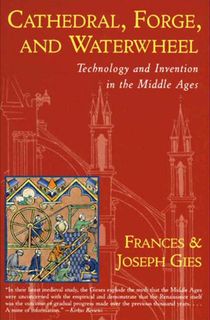
Cathedral, Forge, and Waterwheel
Frances and Joseph Gies are back with this “mine of information” about technological advances during the Middle Ages (Kirkus Reviews). It has long been believed that medieval Europe was a land of stagnancy, that the fall of the Roman Empire halted the flow of new ideas and inventions until the dawn of the Renaissance. The Gieses reject this claim and offer the alternative argument that the Renaissance was actually a result of the advancements that occurred throughout the Middle Ages. The authors explore numerous specific examples of medieval ingenuity between the years 500 and 1500, as well as acknowledging the contributions of China and the Islamic world. Read this book and watch the myth of the Dark Ages fade before your eyes.
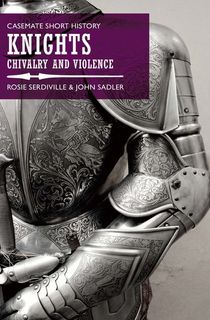
Knights
This is a deep dive into one of the most iconic figures of medieval times: the knight. Knights began to train as young boys, and were only knighted after at least 14 years of training and proving their mastery of many skills. Knights began as just warriors on horseback, but over time they became connected to the code of chivalry and peacetime activities such as tournaments. Knights held the dual role of embodying chivalry—being loyal, honorable, just, and brave—and being the executors of great violence, whether in battles and crusades or in tournaments against one another. Authors Rosie Serdiville and John Sadler explore all of the essential roles and attributes of knights throughout the period, as well the lasting legend and cultural impact of the knight.
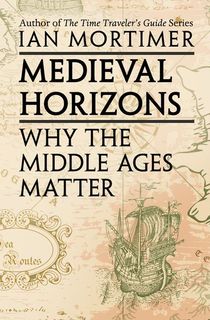
Medieval Horizons
In this book from “the most remarkable medieval historian of our time,” Ian Mortimer covers the sweeping changes that took place during the medieval era and the long-lasting effects of the period on Western society (Times, UK). Mortimer addresses how people’s “horizons” vastly expanded between the years of 1000 and 1600. He paints a picture of the Middle Ages characterized by growth and development of the mind, from increased literacy to the development of philosophy surrounding a sense of self.
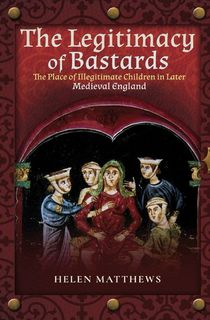
The Legitimacy of Bastards
This book focuses on a population of people not often remembered in history: illegitimate children. In the Middle Ages, land was closely tied to wealth. Marriages were arranged to maximize wealth and power; therefore, there were a lot of loveless unions that resulted in infidelity. A child who was born out of wedlock was considered “filius nullius,” son of no one, and was not able to inherit property or join the priesthood. Helen Matthews provides a thorough examination of how parents found creative solutions to provide for their illegitimate children and the role these children played in society. This first book of its kind contains a wealth of information about bastards, their parents, and how they were regarded by both English law and the Church.
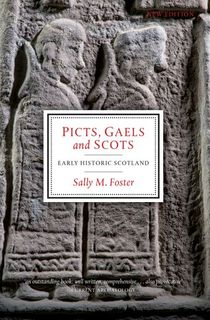
Picts, Gaels and Scots
While many of the books on this list focus on England, Sally M. Foster takes readers north to Scotland. From the fifth century through the tenth century, there were multiple different tribes and peoples dwelling on this land; however, by the 11th century they were unified into one kingdom. Foster details the kingdoms of the Picts and the Gaels during this time. Using new archaeological evidence, she covers the origins of each tribe as well as their contributions to society and their ways of life, including art, war, religion, and agriculture. Ultimately, she answers the question of how these peoples became the Scots.
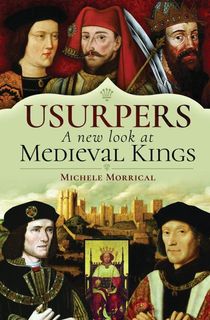
Usurpers, A New Look at Medieval Kings
Throughout the Middle Ages in England, there were men who rose up and disrupted the established monarchy. In this “masterpiece of academic scholarship,” Michele Morrical investigates the cases of six men who successfully deposed kings and installed themselves as the reigning monarchs (Midwest Book Review). Incorporating not just the stories of these six kings but of many important and interesting medieval figures, Morrical sets the scene of a country rife with competition and contention. Readers will be exposed to rich evidence to uncover if these men truly deserve the title of usurper or if history was just recorded against them.
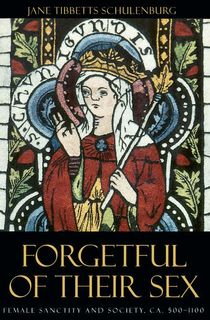
Forgetful of Their Sex
In medieval England, the Church was an enormous part of society and its actions are representative of general attitudes and mindsets during the time. In this impressive work, Jane Schulenberg examines over 2,200 medieval saints, male and female, to present insight into the roles and experiences of women in England and in the Church. Schulenberg explores many factors that affected medieval women and “informs our ideas regarding the role of saints in the medieval psyche, gender-specific identification, and the heroics of virginity” (Library Journal). Readers will be sure to learn something new about the unique identification of sainthood in the medieval world.
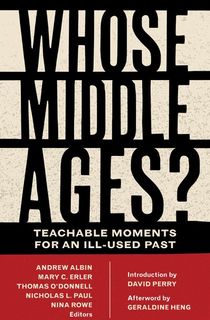
Whose Middle Ages?
The 22 essays included in this collection rally against the Middle Ages being used as symbols by nationalist, racist organizations. These radical groups often employ imagery of the Crusades and argue that media portrayal of medieval Europe must only include an all-white cast, in the name of historical accuracy. Each author clearly explains their research process and the resulting book is “an ethical and accessible introduction to a historical period often implicated in racist narratives of nationalism and imperialism” that paints a more nuanced and diverse depiction of the Middle Ages (Sierra Lomuto, Assistant Professor of Global Medieval Literature, Rowan University).
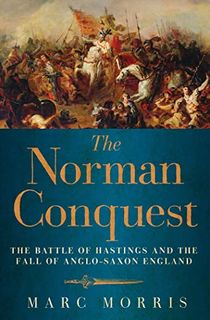
The Norman Conquest
Acclaimed historian Marc Morris chronicles the Norman conquest of England and the seismic cultural changes that it caused in this USA Today bestseller described by Publishers Weekly as “readable, authoritative, and remarkably nuanced.” In 1066, William the Conqueror of France invaded Anglo-Saxon England in a brutal fight for control that transformed England’s identity. Everything from its language and laws to its architecture were impacted by William’s conquest. Beginning decades before the invasion commenced and concluding with William the Conqueror’s death in 1087, Morris delivers a comprehensive account of the Norman invasion, William’s decisive victory at the Battle of Hastings, and the reasons why his dream of a unified Anglo-Norman kingdom ultimately collapsed under the weight of rebellion and greed.
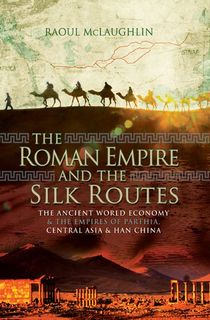
The Roman Empire and the Silk Routes
Historians generally mark the beginning of the Middle Ages at the fall of western Roman civilization in 476 CE. For a fascinating glimpse into this antecedent era, check out Raoul McLaughlin’s The Roman Empire and the Silk Routes. McLaughlin’s ancient history narrative explores the intricate network of trade routes that stretched across Europe and the Middle East and connected the Holy Roman Empire with the empires of inner Asia and ancient China. These trade routes, which played a vital role in the cultural exchanges between the regions, were revived in the 13th and 14th centuries of the Late Middle Ages and were used by Marco Polo on his journey from Italy to China. Of course, yet another medieval traveler likely passed along these routes: the Black Death, which claimed the lives of millions of people across Eurasia in the mid-1300s.
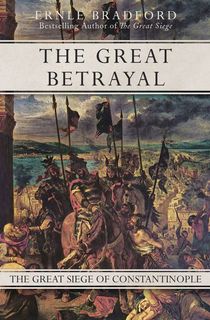
The Great Betrayal
The Crusades cut a brutal path across the Middle East and parts of Europe in the Middle Ages. In this engrossing work, historian Ernle Bradford (Hannibal, The Great Siege) hones in on the sacking of Constantinople at the dawn of the 13th century by the army of the Fourth Crusade. The crusading army originally set out to recapture the Muslim-held city of Jerusalem before altering course and descending upon Constantinople, the capital of the Byzantine Empire and a bastion of Christianity in the east. The sacking and pillaging of the city shattered relations between the Catholic and Orthodox churches for centuries afterward. Bradford expertly tracks the greed and manipulation that led this great betrayal, and the far-reaching impact it had on the mediaeval world.
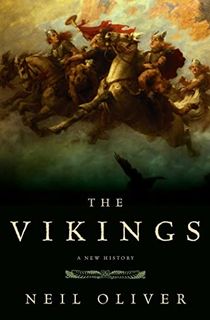
The Vikings
The Vikings were not ones to keep extensive written records, leaving behind precious few runestones as their literary legacy. Filling this historical void are a number of exaggerated myths about the Viking people—for instance, did you know that no evidence exists to suggest the Vikings wore horned helmets during battle? In Vikings, archeologist Neil Oliver digs through the centuries to set the record straight, producing a full and nuanced portrait of the Viking empire of medieval northern Europe. Drawing on historical documents as well as recent discoveries, Oliver goes beyond the prevailing image of Vikings as bearded (and, yes, horn-helmeted) marauders to reveal a determined people of chieftains, warlords, and maritime explorers who reached as far west as America and far east as Baghdad.
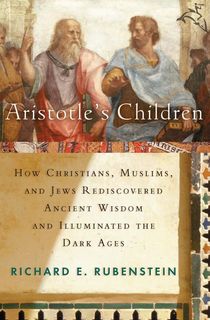
Aristotle's Children
Richard E. Rubenstein examines a pivotal moment in history when ancient philosophy broke through and illuminated the medieval era. In 12th century Toledo, Spain, a group of Muslim, Jewish, and Christian scholars set about translating the works of Aristotle. The resulting translations spread across medieval Europe, sparking a revival in the forgotten Greek philosopher’s ideas. Dissemination of the translations also rocked the Catholic Church to its core, as religious leaders struggled to square church dogma with Aristotle’s controversial understanding of the soul of man and the natural world. In Aristotle's Children, Rubenstein delivers a superb account of a turning point in medieval history and a "first-rate study in the history of ideas." (Publishers Weekly).

A Distant Mirror: The Calamitous 14th Century
Two-time Pulitzer Prize–winning author Barbara W. Tuchman (The Guns of August) crafts a sweeping account of the grand calamities and human heartbeats of 14th century Europe in this thoroughly researched and “beautifully written” (New York Review of Books) historical narrative. The author conveys big-picture moments through the lives of those who lived them, introducing readers to a lively cast of peasants, nobles, and clergymen as she explores everything from medieval class struggles and domestic traditions to the devastation of the plague and the Hundred Years’ War.

The Great Mortality: An Intimate History of the Black Death, the Most Devastating Plague of All Time
In 1347, the Black Death reached medieval Europe’s southern shores via Genoese merchant ships returning from the East. By 1351, it had ravaged the continent, laying waste to a third of Europe’s population. In this harrowing account, John Kelly draws on a wealth of source material—from historical records to chilling journal entries and letters—to recreate the pandemic’s path of ruin across Europe. Throughout, readers not only come to grips with the sheer scale of devastation produced by the Black Death but also witness the human suffering it caused and the lasting impact it had on European history.

Eleanor of Aquitaine: A Life
New York Times bestselling author Alison Weir is a master of the regal biography, from The Life of Elizabeth I to Mistress of the Monarchy: The Life of Katherine Swynford, Duchess of Lancaster and Queen Isabella: Treachery, Adultery, and Murder in Medieval England. Here, the author applies her royal talents to chronicling the extraordinary life of Eleanor of Aquitaine. Born in southwestern France in the early 12th century, Eleanor was renowned for her beauty. At a time when women were viewed as property and subservient to household and husband, she married two kings and wielded substantial political power over her husbands and sons. Weir’s well-researched account brings to life this royal heroine of medieval Europe, capturing the splendor and scandal that defined her. Readers in search of more narratives about powerful women of the Middle Ages should next check out Helen Castor’s She-Wolves: The Women Who Ruled England Before Elizabeth.

Foundation: The History of England from Its Earliest Beginnings to the Tudors
Acclaimed English chronicler Peter Ackroyd is the author of numerous books, including a multi-volume set on the history of England. Foundations, published in 2011, is his first in the series. In it, Ackroyd charts the nation’s ancient story, from the construction of Stonehenge to the religious monuments and royal wars of medieval England and the reign of Henry VII. Epic in scale and yet studded with intimate detail, Ackroyd masterfully "paints a portrait of early England that is both historically rich and compellingly human." (Shelf Awareness)

Life in a Medieval City
Frances and Joseph Geis invite readers into the city of Troyes for an intimate look at what medieval city life was like in this charming historical work, the first in a series that also includes Life in a Medieval Castle and Life in a Medieval Village. The husband and wife historians vividly evoke the sights, sounds, smells, and customs of the 13th century city, from its bustling market square to the day-to-day exchanges between its serfs and lords. And for all the fantasy fans in the audience: George R.R. Martin used Life in a Medieval Castle and Life in a Medieval City as a source of inspiration for his A Game of Thrones series.
This post is sponsored by Open Road Media. Thank you for supporting our partners, who make it possible for The Archive to continue publishing the history stories you love.







